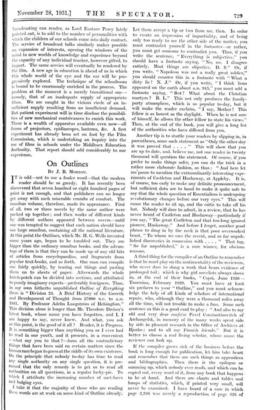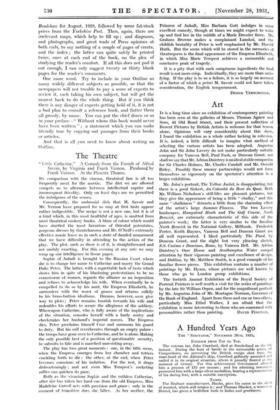On Outlines
BY J. B. MORTON.
IT is odd—not to use a fouler word—that the modern reader should be so greedy. It has recently been discovered that seven hundred or eight hundred pages of print is not enough, and that publishers can no longer get away with such miserable crumbs of comfort. The omnibus volume, therefore, made its appearance. First of all, two or three novels by the same author were packed up together ; and then works of different kinds by different authors appeared between covers—until one was tempted to suggest that each nation should have one large omnibus, containing all the national literature. At this point the Outlines, which Mr. H. G. Wells invented some years ago, began to be tumbled out. They are bigger than the ordinary omnibus books, and the advan- tage of them is that they can be made up of any old bits of articles from encyclopaedias, and fragments from popular text-books, and so forth. One man can compile one fairly quickly, by tearing out things and pasting them on to sheets of paper. Afterwards the whole hotch-potch can be divided into sections, and attributed to purely imaginary experts—preferably foreigners. Thus, in my own hitherto unpublished Outline of Everything there is " Division 24. A Brief History of the Growth and Development of Thought from 27000 me. to A.D. 1931. By Professor Adelm Lungstrom of Helsingfors." This division alone is longer than Mr. Theodore Dreiser's latest book, whose name you have forgotten, and I, I am happy to say, never knew. And what, you ask at this point, is the good of it all ? Reader, it is Progress. It is something bigger than anything you or I ever had to read in our youth, and it presents, in a convenient —what say you to that ?—form all the contradictory things that have been said on certain matters since the human race began to guess at the riddle of its own existence. On the principle that nobody to-day has time to read any single authority on any single question, it is pre- sumed that the only remedy is to get us to read all authorities on all questions, in a regular lucky-pie. To which I attribute• the increasing number of suet-faces and bulging eyes.
I take it that the majority of those who are reading these words are at work on some kind of Outline already. Let them accept a tip or two from me, then. In order to create an impression of impartiality, and of being only too ready to see the other side of the matter, you must contradict yourself in the footnotes—or rather, you must get someone to contradict you. Thus, if you write the sentence, " Everything is subjective," you should have a footnote saying, " No, no. I disagree entirely. Most things are objective. D. S." Or, if you write, " Napoleon was not a really great soldier," you should counter this in a footnote with " What a dirty lie ! N. J." Or, if you write, " I think lions appeared on the earth about A.D. 945," you must add a footnote saying, " Rot ! What about the Christian martyrs ? B. L." This not only produces the family- party atmosphere, which is so popular to-day, but it will make the reader exclaim, " I say, Mother This fellow is as honest as the daylight. When he is not sure of himself, he allows the other fellow to state his views." Then, at the end of the book, you will give a long list of the authorities who have differed from you.
Another tip is to startle your readers by slipping in, in parentheses, some such statement as "Only the other day it was proved that . . . . " This will show that you are up to date, and, believe me, not one reader in twenty thousand will question the statement. Of course, if you prefer to make things safer, you can do the trick in a rather more elaborate fashion, as thus : " And here let me pause to mention the extraordinarily interesting expe- riments of Castleton and Hushaway, at Appleby. It is, of course, too early to make any definite pronouncement, but sufficient data are to hand to make it quite safe to say that the whole question of Essentialism is undergoing revolutionary changes before our very eyes." This will cause the reader to sit up, and the critic to take off his hat. Nobody will dare to admit, in a review, that he has never heard of Castleton and Hushaway—particularly if you say, " The great Castleton and that too-long ignored pioneer, Hushaway." And before I forget, another good phrase to drag in by the neck is that poor overworked beast, " To whom we owe the recent, and so far unpub- lished discoveries in connexion with . . . . " That tag, " So far unpublished," is a sure winner, for obvious reasons.
A third thing for the compiler of an Outline to remember is that he must play on the sentimentality of the reviewers, who never dare to slang a work that bears evidence of prolonged toil ; which is why girl novelists always shove in, at the end of their books, " Capri, June 1926— Taormina, February 1929. You must have at least six prefaces to your " Outline," and you must acknow- ledge the help of all kinds of scholars of international repute, who, although they were a thousand miles away all the time, will not trouble to make a fuss. Some such sentence as this is a good card to play : " And also to my old and very dear confrere Pavel Constantinovitch of ArehangeLsk, in memory of the many weeks spent side by side in pleasant research in the Office of Archives at Bjorko ; and to all my Finnish friends." But it is better to choose a real living scholar, whose name the reviewer can look up.
If the compiler grows sick of the business before the book is long enough for publication, let him take heart and remember that there arc such things as appendices and bibliographies. Then there is the epilogue or summing up, which nobody ever reads, and which can be copied out, every word of it, from any book that happens to be at hand. And there are charts and tables and lumps of statistics, which, if printed very small, will never be examined. I have heard of a case in which page 2,346 was merely a reproduction of page 426 of Bradshaw for August, 1929, followed by some fat-stock prices from the Yorkshire Post. Then, again, there are irrelevant maps, which help to fill up ; and diagrams, and photographs, and great wads of Press opinions at both ends, to say nothing of a couple of pages of errata, and the index ; the latter can quite safely be printed twice, once at each end of the book, on the plea of studying the reader's comfort. If all this does not pad it out enough, I can only suggest twenty or thirty blank pages for the reader's comments.
One more word. Try to include in your Outline as many widely different subjects as possible, so that the newspapers will not trouble to pay a score of experts to review it, each taking his own subject, but will get the nearest hack to do the whole thing. But if you think there is any danger of experts getting hold of it, it is not a had plan to consult a reference book, and flatter them all grossly, by name. You can put the chief dozen or so in your preface—" Without whom this book would never have been written " ; a statement which you can make literally true by copying out passages from their books or articles.
And that is all you need to know about writing an Outline.







































 Previous page
Previous page